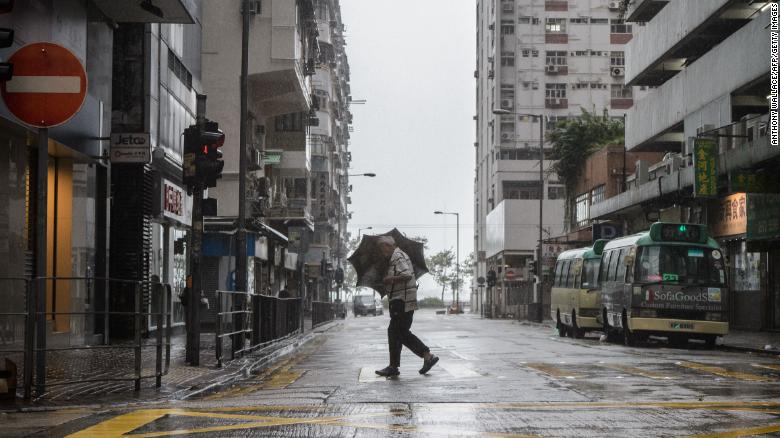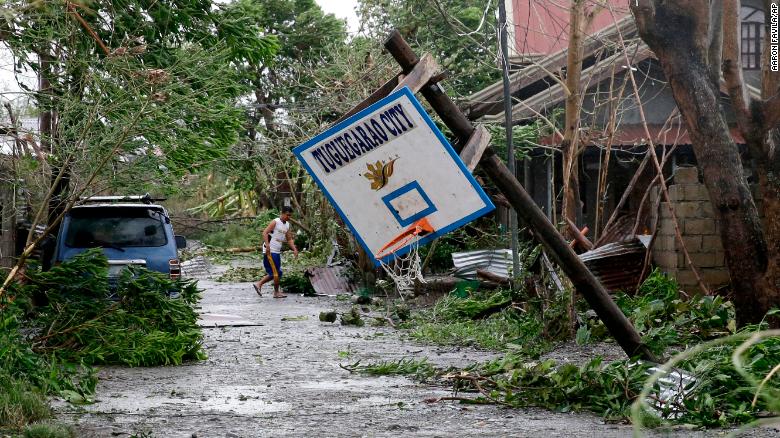Typhoon slams Philippines as Mangkhut claims first victims
By Jinky Jorgio and Hilary Clarke
Updated 10:35 PM ET, Sat September 15, 2018
(CNN)The extent of the damage inflicted by Typhoon Mangkut on the northern Philippines was difficult to assess Sunday as fierce winds were replaced by flood waters, blocking access and aid to affected areas.
At least two people were killed as the world's strongest typhoon this year, known locally as Ompong, slammed into the Southeast Asian country in the early hours of Saturday morning.
Mangkhut ripped roofs off buildings, uprooted trees, blocked roads with debris and dumped water on fields of crops that farmers weren't able to harvest ahead of the storm.
The typhoon is closing in on Hong Kong which raised its typhoon warning alert again on Sunday morning local time to T9, the second highest level, as the storm swirled 220 kilometers (136 miles) south-southeast of the island.

A man uses his umbrella while crossing a road as super Typhoon Mangkhut edges closer to Hong Kong on September 16, 2018.
Mangkhut could be one of the strongest storms to hit Hong Kong in more than six decades, but the city is well prepared for wild weather and started shutting down, closing shops and suspending travel as Mangkut approached.
The storm system is currently moving at 30 kilometers per hour (19 miles per hour) towards the coast of western Guangdong, mainland China, according to the Hong Kong Observatory.
Manghkut slams into the Philippines
When it made landfall in the Philippines Saturday morning at 1:40 a.m. local time, Mangkhut was packing winds of up to 270 kph (165 mph), 120 kph (75 mph) stronger than Hurricane Florence that hit North Carolina.
While the death toll is likely to rise, there was some relief in the Philippines that it doesn't appear to have been as fatal as other recent, less powerful, storms.

Photos: In photos: Typhoon Mangkhut
Commuters brave the elements in Manila on September 15.
Hide Caption
22 of 42

Photos: In photos: Typhoon Mangkhut
Strong winds and rain batter buildings in Tuguegarao City on September 15.
Hide Caption
23 of 42

Photos: In photos: Typhoon Mangkhut
Street sweepers go about their daily business as rain and strong winds pound Manila on September 15.
Hide Caption
24 of 42

Photos: In photos: Typhoon Mangkhut
Guests sleep inside a hotel restaurant after strong winds damaged the roof of their room in Tuguegarao City on September 15.
Hide Caption
25 of 42

Photos: In photos: Typhoon Mangkhut
Heavy rain falls in Tuguegarao City on Friday, September 14.
Hide Caption
26 of 42

Photos: In photos: Typhoon Mangkhut
Officials conduct a patrol in Aparri ahead of the typhoon on September 14.
Hide Caption
27 of 42

Photos: In photos: Typhoon Mangkhut
A satellite image shows the width and trajectory of Mangkhut as it approaches the Philippines on September 14.
Hide Caption
28 of 42

Photos: In photos: Typhoon Mangkhut
A farmer gathers his herd of cows to a safe place as the typhoon nears Tuguegarao City on September 14.
Hide Caption
29 of 42

Photos: In photos: Typhoon Mangkhut
Fishermen secure a boat in Aparri before the storm arrives on September 14.
Hide Caption
30 of 42

Photos: In photos: Typhoon Mangkhut
Villagers from Aparri cut tree branches on September 14 in preparation for the massive storm.
Hide Caption
31 of 42

Photos: In photos: Typhoon Mangkhut
An evacuee rests inside an evacuation center in Tuguegarao City on September 14.
Hide Caption
32 of 42

Photos: In photos: Typhoon Mangkhut
A volunteer moves through relief goods September 14 as Tuguegarao prepares for the typhoon's arrival.
Hide Caption
33 of 42

Photos: In photos: Typhoon Mangkhut
Residential buildings in Hong Kong are reflected in a McDonald's restaurant window, taped in preparation for Typhoon Mangkhut, on September 14. Hong Kong and Macau are currently in the typhoon's path.
Hide Caption
34 of 42

Photos: In photos: Typhoon Mangkhut
Workers lay sandbags at the waterfront of the Lei Yue Mun area of Hong Kong on September 14.
Hide Caption
35 of 42

Photos: In photos: Typhoon Mangkhut
People secure the roof of a house in Tuguegarao on September 14.
Hide Caption
36 of 42

Photos: In photos: Typhoon Mangkhut
A worker steps over sandbags ahead of the typhoon's arrival in Hong Kong on September 14.
Hide Caption
37 of 42

Photos: In photos: Typhoon Mangkhut
Fishermen work amid the rough seas near Aparri on September 14.
Hide Caption
38 of 42

Photos: In photos: Typhoon Mangkhut
Philippine President Rodrigo Duterte arrives for a government briefing on the typhoon at the National Disaster Risk Reduction and Management Council in Quezon City on Thursday, September 13.
Hide Caption
39 of 42

Photos: In photos: Typhoon Mangkhut
Duterte, second from left, observes the disaster agency's operation center in action in Manila on September 13.
Hide Caption
40 of 42

Photos: In photos: Typhoon Mangkhut
High-rises are visible above choppy waters in Hong Kong's Wan Chai District on Wednesday, September 12.
Hide Caption
41 of 42

Photos: In photos: Typhoon Mangkhut
Sailors remove debris on a US naval base in Guam on Tuesday, September 11, after the typhoon swept through the island territory, causing flooding and power outages.
Hide Caption
42 of 42

Photos: In photos: Typhoon Mangkhut
Residents stand by a flooded road in Tuguegarao city in northeastern Philippines, on Saturday, September 15.
Hide Caption
1 of 42

Photos: In photos: Typhoon Mangkhut
A man takes a photograph as waves crash over a promenade in Hong Kong, on Sunday, September 16.
Hide Caption
2 of 42

Photos: In photos: Typhoon Mangkhut
A man takes photos as Super Typhoon Mangkhut approaches Hong Kong on Sunday, September 16.
Hide Caption
3 of 42

Photos: In photos: Typhoon Mangkhut
A wave overwhelms a man as he tries to recover salvageable materials in Manila, Philippines, on Saturday, September 15.
Hide Caption
4 of 42

Photos: In photos: Typhoon Mangkhut
An elderly man waits for a taxi as Typhoon Mangkhut edges closer to Hong Kong, on Sunday, September 16.
Hide Caption
5 of 42

Photos: In photos: Typhoon Mangkhut
People pray inside of a temple ahead of the arrival of Typhoon Mangkhut in Sanhe village, China, on Saturday.
Hide Caption
6 of 42

Photos: In photos: Typhoon Mangkhut
Fishermen remove their boat from the water ahead of the arrival of Typhoon Mangkhut on the outskirts of Zhanjiang, China, on Saturday.
Hide Caption
7 of 42

Photos: In photos: Typhoon Mangkhut
Volunteers and police check on residents after Typhoon Mangkhut hit Tuguegarao, Philippines, on Saturday.
Hide Caption
8 of 42

Photos: In photos: Typhoon Mangkhut
A family shares a meal by flashlight inside a temporary evacuation center after electricity was shut off following the onslaught of Typhoon Mangkhut in the city of Tuguegarao, Philippines, on Saturday.
Hide Caption
9 of 42

Photos: In photos: Typhoon Mangkhut
An elderly Filipino woman copes in the typhoon-hit town of Aparri, Philippines, on September 15.
Hide Caption
10 of 42

Photos: In photos: Typhoon Mangkhut
Members of a family survey their heavily damaged home in Alcala, Philippines, on September 15.
Hide Caption
11 of 42

Photos: In photos: Typhoon Mangkhut
A basketball hoop is toppled in Tuguegarao City, Philippines, on September 15.
Hide Caption
12 of 42

Photos: In photos: Typhoon Mangkhut
Philippine soldiers help a man with a sick child after fallen electric poles blocked an ambulance transporting them in Baggao, a town north of Manila, on September 15.
Hide Caption
13 of 42

Photos: In photos: Typhoon Mangkhut
A woman weeps as she describes her family's experiences during the typhoon in Baggao on September 15.
Hide Caption
14 of 42

Photos: In photos: Typhoon Mangkhut
Crews work to clear a road of debris in Baggao on September 15.
Hide Caption
15 of 42

Photos: In photos: Typhoon Mangkhut
Motorists negotiate a flooded street in Manila on September 15.
Hide Caption
16 of 42

Photos: In photos: Typhoon Mangkhut
Children collect recyclable materials washed ashore in Manila on September 15.
Hide Caption
17 of 42

Photos: In photos: Typhoon Mangkhut
A motorist tries to avoid the flooding in Manila on September 15.
Hide Caption
18 of 42

Photos: In photos: Typhoon Mangkhut
Residents make their way through destroyed stalls at a public market in Tuguegarao City on September 15.
Hide Caption
19 of 42

Photos: In photos: Typhoon Mangkhut
Commuters push a car through floodwaters in Manila on September 15.
Hide Caption
20 of 42

Photos: In photos: Typhoon Mangkhut
Motorists push their motor bikes through a flooded street in Manila on September 15.
Hide Caption
21 of 42

Photos: In photos: Typhoon Mangkhut
Commuters brave the elements in Manila on September 15.
Hide Caption
22 of 42

Photos: In photos: Typhoon Mangkhut
Strong winds and rain batter buildings in Tuguegarao City on September 15.
Hide Caption
23 of 42

Photos: In photos: Typhoon Mangkhut
Street sweepers go about their daily business as rain and strong winds pound Manila on September 15.
Hide Caption
24 of 42

Photos: In photos: Typhoon Mangkhut
Guests sleep inside a hotel restaurant after strong winds damaged the roof of their room in Tuguegarao City on September 15.
Hide Caption
25 of 42

Photos: In photos: Typhoon Mangkhut
Heavy rain falls in Tuguegarao City on Friday, September 14.
Hide Caption
26 of 42

Photos: In photos: Typhoon Mangkhut
Officials conduct a patrol in Aparri ahead of the typhoon on September 14.
Hide Caption
27 of 42

Photos: In photos: Typhoon Mangkhut
A satellite image shows the width and trajectory of Mangkhut as it approaches the Philippines on September 14.
Hide Caption
28 of 42

Photos: In photos: Typhoon Mangkhut
A farmer gathers his herd of cows to a safe place as the typhoon nears Tuguegarao City on September 14.
Hide Caption
29 of 42

Photos: In photos: Typhoon Mangkhut
Fishermen secure a boat in Aparri before the storm arrives on September 14.
Hide Caption
30 of 42

Photos: In photos: Typhoon Mangkhut
Villagers from Aparri cut tree branches on September 14 in preparation for the massive storm.
Hide Caption
31 of 42

Photos: In photos: Typhoon Mangkhut
An evacuee rests inside an evacuation center in Tuguegarao City on September 14.
Hide Caption
32 of 42

Photos: In photos: Typhoon Mangkhut
A volunteer moves through relief goods September 14 as Tuguegarao prepares for the typhoon's arrival.
Hide Caption
33 of 42

Photos: In photos: Typhoon Mangkhut
Residential buildings in Hong Kong are reflected in a McDonald's restaurant window, taped in preparation for Typhoon Mangkhut, on September 14. Hong Kong and Macau are currently in the typhoon's path.
Hide Caption
34 of 42

Photos: In photos: Typhoon Mangkhut
Workers lay sandbags at the waterfront of the Lei Yue Mun area of Hong Kong on September 14.
Hide Caption
35 of 42

Photos: In photos: Typhoon Mangkhut
People secure the roof of a house in Tuguegarao on September 14.
Hide Caption
36 of 42

Photos: In photos: Typhoon Mangkhut
A worker steps over sandbags ahead of the typhoon's arrival in Hong Kong on September 14.
Hide Caption
37 of 42

Photos: In photos: Typhoon Mangkhut
Fishermen work amid the rough seas near Aparri on September 14.
Hide Caption
38 of 42

Photos: In photos: Typhoon Mangkhut
Philippine President Rodrigo Duterte arrives for a government briefing on the typhoon at the National Disaster Risk Reduction and Management Council in Quezon City on Thursday, September 13.
Hide Caption
39 of 42

Photos: In photos: Typhoon Mangkhut
Duterte, second from left, observes the disaster agency's operation center in action in Manila on September 13.
Hide Caption
40 of 42

Photos: In photos: Typhoon Mangkhut
High-rises are visible above choppy waters in Hong Kong's Wan Chai District on Wednesday, September 12.
Hide Caption
41 of 42

Photos: In photos: Typhoon Mangkhut
Sailors remove debris on a US naval base in Guam on Tuesday, September 11, after the typhoon swept through the island territory, causing flooding and power outages.
Hide Caption
42 of 42

Photos: In photos: Typhoon Mangkhut
Residents stand by a flooded road in Tuguegarao city in northeastern Philippines, on Saturday, September 15.
Hide Caption
1 of 42

Photos: In photos: Typhoon Mangkhut
A man takes a photograph as waves crash over a promenade in Hong Kong, on Sunday, September 16.
Hide Caption
2 of 42

Photos: In photos: Typhoon Mangkhut
A man takes photos as Super Typhoon Mangkhut approaches Hong Kong on Sunday, September 16.
Hide Caption
3 of 42

Photos: In photos: Typhoon Mangkhut
A wave overwhelms a man as he tries to recover salvageable materials in Manila, Philippines, on Saturday, September 15.
Hide Caption
4 of 42

Photos: In photos: Typhoon Mangkhut
An elderly man waits for a taxi as Typhoon Mangkhut edges closer to Hong Kong, on Sunday, September 16.
Hide Caption
5 of 42

Photos: In photos: Typhoon Mangkhut
People pray inside of a temple ahead of the arrival of Typhoon Mangkhut in Sanhe village, China, on Saturday.
Hide Caption
6 of 42

Photos: In photos: Typhoon Mangkhut
Fishermen remove their boat from the water ahead of the arrival of Typhoon Mangkhut on the outskirts of Zhanjiang, China, on Saturday.
Hide Caption
7 of 42

Photos: In photos: Typhoon Mangkhut
Volunteers and police check on residents after Typhoon Mangkhut hit Tuguegarao, Philippines, on Saturday.
Hide Caption
8 of 42

Photos: In photos: Typhoon Mangkhut
A family shares a meal by flashlight inside a temporary evacuation center after electricity was shut off following the onslaught of Typhoon Mangkhut in the city of Tuguegarao, Philippines, on Saturday.
Hide Caption
9 of 42

Photos: In photos: Typhoon Mangkhut
An elderly Filipino woman copes in the typhoon-hit town of Aparri, Philippines, on September 15.
Hide Caption
10 of 42

Photos: In photos: Typhoon Mangkhut
Members of a family survey their heavily damaged home in Alcala, Philippines, on September 15.
Hide Caption
11 of 42

Photos: In photos: Typhoon Mangkhut
A basketball hoop is toppled in Tuguegarao City, Philippines, on September 15.
Hide Caption
12 of 42

Photos: In photos: Typhoon Mangkhut
Philippine soldiers help a man with a sick child after fallen electric poles blocked an ambulance transporting them in Baggao, a town north of Manila, on September 15.
Hide Caption
13 of 42

Photos: In photos: Typhoon Mangkhut
A woman weeps as she describes her family's experiences during the typhoon in Baggao on September 15.
Hide Caption
14 of 42

Photos: In photos: Typhoon Mangkhut
Crews work to clear a road of debris in Baggao on September 15.
Hide Caption
15 of 42

Photos: In photos: Typhoon Mangkhut
Motorists negotiate a flooded street in Manila on September 15.
Hide Caption
16 of 42

Photos: In photos: Typhoon Mangkhut
Children collect recyclable materials washed ashore in Manila on September 15.
Hide Caption
17 of 42

Photos: In photos: Typhoon Mangkhut
A motorist tries to avoid the flooding in Manila on September 15.
Hide Caption
18 of 42

Photos: In photos: Typhoon Mangkhut
Residents make their way through destroyed stalls at a public market in Tuguegarao City on September 15.
Hide Caption
19 of 42

Photos: In photos: Typhoon Mangkhut
Commuters push a car through floodwaters in Manila on September 15.
Hide Caption
20 of 42

Photos: In photos: Typhoon Mangkhut
Motorists push their motor bikes through a flooded street in Manila on September 15.
Hide Caption
21 of 42










































More than 6,000 people died when Super Typhoon Yolanda hit the Philippines five years ago, the worst in a generation. That storm displaced nearly 4 million people. Many of the survivors ran short of food, water and medicine almost immediately.
"Honestly, we were expecting the worst from this," Edgar Posadas, a spokesperson for the National Disaster Risk and Reduction Management Council (NDRRMC) told CNN, of Mangkhut.
"I was praying and hoping and worried about having so much casualties. But I think after Yolanda, after Haiyan [the international name for Yolanda], there were a lot of lessons that were learned in terms of preparedness, early warnings, preemptive evacuations... and this went a long way."
The two people confirmed dead were rescue workers, said Ricardo Jalad, executive director of the Philippines National Disaster Risk Reduction and Management Council. Both victims were women, killed when a rain-drenched hillside collapsed on them, according to the French news agency AFP.
As of Saturday, the storm had caused 51 landslides across the region.

A resident walks beside a toppled basketball court after Typhoon Mangkhut barreled across Tuguegarao city, Cagayan province.
The Philippines military is sending two C-130 airplanes and 10 helicopters to Cagayan province for typhoon relief and rescue efforts, Defense Secretary Delfin Lorenzana said Saturday, according to Philippine News Agency (PNA).
They'll fly from Manila once the weather improves, Lorenzana said, carrying aid and allowing rescuers to reach remote areas of the mountainous north.
Earlier, in the provincial capital Tuguegarao, strong winds lashed buildings, pulling off entire roofs and throwing large chunks of debris into the air.
The Governor of Cagayan, Manuel Maamba said emergency services are clearing debris from main roads. Power and communication lines are also down, making it hard to contact more remote areas and assess damage.
Tuguegarao airport in northern Luzon, a vital transportation hub, has also been damaged, potentially complicating efforts to bring in humanitarian aid.
The Philippines Red Cross said waters were rising in parts of Tuguegarao. Video on social media showed people in the city wading through ankle-deep water, amid torrential rains.
Typhoon #OmpongPH at its worst in Tuguegarao City, Cagayan Province as of 12:30 a.m. @cnnphilippines
"There was plywood and shards of glass flying through the corridors," storm chaser James Reynolds, who was in a hotel in Santa Ana, in Cagayan, told CNN. "It must be hell for the people out there living in huts and fragile homes, must be terrifying."
The scale of the typhoon could be felt in the Philippines capital Manila, more than 340 km (200 miles) from the eye of the storm, where heavy overnight rains have led to widespread flooding in urban areas.
Heading to China
Mangkhut's eye is now over water in the South China Sea and making its way toward Hong Kong and southern China. The Hong Kong Observatory urged the public to stay on the alert and said the typhoon will be closest around noon Sunday.
Residents taped up windows and secured anything that could take flight in strong winds.

A resident tapes up her front entrance window in the fishing village of Tai O in Hong Kong on September 15, 2018.
Strong winds and heavy rain hit Hong Kong during the early hours of Sunday, and conditions are expected to intensify as the day goes on. Current sustained winds are at 165 kph (102 mph) with wind gusts of up to 205 kph (127 mph), according to the Hong Kong Observatory.
Wind gusts of over 100 kph (62 mph) have already been recorded at a number of locations in the city, according to CNN's Weather Unit, which predicts wind speeds will increase in the coming hours.
Flights from Hong Kong International Airport were delayed or canceled Sunday, disrupting the travel plans of thousands of passengers. Travelers were urged to check with their airlines.
Train, bus and ferry services to the airport were also suspended, though the airport remains open for passengers who have nowhere else to go.
Typhoon Mangkhut will make another landfall on Sunday night in the Chinese province of Guandong near the cities of Yangjiang and Zhanjiang.
From there the system will continue to move westward and will rain itself out over northern Vietnam, which could lead to some flooding there early next week.
CNN's Jo Shelly and Alexandra Field in Santiago, Philippines and Pauline Lockwood in Hong Kong contributed to this report.

















No comments:
Post a Comment